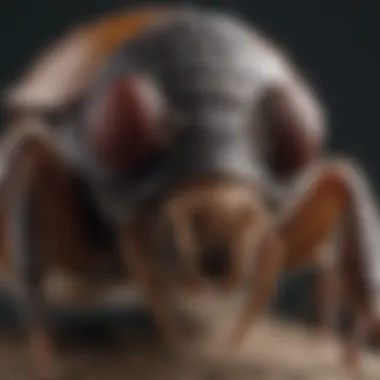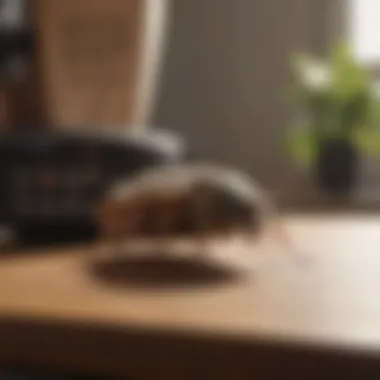Pest Control Challenges and Solutions in Deerfield Beach


Intro
Pest control is a vital aspect for homeowners, especially in areas like Deerfield Beach. This region, characterized by its warm climate and vibrant ecosystems, faces specific challenges concerning pests. Understanding these pests and the methods to control them is essential for maintaining a healthy home and environment.
The following sections will explore various aspects of pest control specific to Deerfield Beach. Key topics include the definition of pests, effective prevention techniques, eco-friendly solutions, and the significance of community involvement. The goal is to equip readers—particularly housewives and homeowners—with the knowledge needed to navigate pest control successfully in their unique geographical context.
Understanding Pests
Definition of Pests
Pests are organisms that can damage crops, spread diseases, and disrupt the comfort of our homes. They include insects, rodents, and even certain plants deemed undesirable. Common pests found in Deerfield Beach include termites, cockroaches, and mosquitoes.
Importance of Pest Identification
Identification is the first step in effective pest control. Understanding what type of pest you are dealing with can determine the method of control. For instance, termites require specific treatments that differ greatly from those used for mosquito control. Timely identification can also prevent more extensive damage to property or health risks to residents.
Prevention Techniques
Home and Garden Preventative Measures
Preventing pest infestations is more effective and economical than dealing with them after they occur. Some essential preventative measures include:
- Sealing Entry Points: Inspect the home for any gaps or cracks that could serve as entry points for pests.
- Proper Waste Disposal: Ensure trash cans are covered and disposed of properly to deter pests like rodents and insects.
- Landscaping: Keep plants trimmed back and avoid overwatering, as stagnant water can attract mosquitoes.
Seasonal Prevention Tips
Seasonal changes can significantly influence pest activity. Here are a few strategies:
- Spring: Check for signs of ants and treat accordingly. Monitor gardens for early signs of pests.
- Summer: Ensure outdoor areas are clean and free of food waste to keep ants and wasps at bay.
- Fall: Seal off any entrances as rodents seek warmth. Maintain cleanliness in storage areas.
- Winter: Inspect plumbing and insulation to avoid pest nests being made inside.
Eco-Friendly Pest Control Solutions
Overview of Sustainable Practices
Many homeowners are interested in eco-friendly pest control solutions that minimize environmental impact. Utilizing sustainable practices can reduce chemical usage and better protect local ecosystems. Some effective practices include:
- Encouraging Natural Predators: Introduce beneficial insects like ladybugs to control aphid populations.
- Planting Native Species: Native plants can help maintain balance in local ecology, potentially reducing pest encounters.
Natural Remedies and Their Effectiveness
Natural remedies can also be effective in managing pests without harmful chemicals. Some popular options include:
- Diatomaceous Earth: This abrasive substance can deter insects when applied to areas where they congregate.
- Essential Oils: Certain oils like peppermint or tea tree have been shown to repel insects effectively.
- Vinegar Solutions: A mixture of vinegar and water can deter ants and other insects when sprayed on affected areas.
Prevention and early detection are key to managing pests effectively, as they can quickly multiply if not addressed promptly.
Pest control is a critical aspect of maintaining a healthy and safe living environment in Deerfield Beach. This area, with its unique climate and geography, creates a welcoming habitat for various pests. Understanding the complexities of pest presence is essential for local homeowners. Effective pest management not only protects property but also helps in preserving public health and community well-being.
The local ecosystem plays a major role in pest dynamics. Factors such as humidity, temperature, and proximity to water bodies contribute to the types and prevalence of pests found in the region. Local knowledge regarding these factors can aid residents in adapting effective strategies for pest prevention.
Additionally, the historical context of pest issues in Deerfield Beach sheds light on recurring problems that homeowners may experience over time. Awareness of these historical pest fluctuations can assist in anticipating and mitigating current challenges.
Another important benefit of understanding local pest control is the promotion of environmentally friendly practices. Using appropriate pest management strategies can minimize harm to beneficial insects and the surrounding flora. This is not just about addressing current pest problems but also entails preparing for future issues.


In summary, a comprehensive overview of pest control practices in Deerfield Beach is indispensable. It engages homeowners with essential information relevant to their properties, local ecology, and historical challenges.
Geographical Influences on Pest Presence
The geography of Deerfield Beach significantly impacts which pests thrive in the community. The region's subtropical climate, characterized by warm temperatures and high humidity, provides an ideal breeding ground for insects. Mosquitoes and ants are among the most common pests here, with the Everglades National Park nearby contributing to their prevalence. The presence of standing water in some areas attracts mosquitoes, making them a primary concern for public health. Also, drainage patterns and proximity to vegetation can affect pest distribution within neighborhoods.
Moreover, the coastal location allows for specific species, such as termites, to thrive due to the availability of wood and moisture. The wooden structures prevalent in many homes create a conducive environment for this destructive pest, enhancing the urgency for proactive pest control measures. Furthermore, seasonal migrations of pests, influenced by weather patterns, can also alter their local populations. Understanding these geographical influences equips residents with the knowledge needed to tackle pest issues effectively.
Historical Context of Pest Issues
Pest problems in Deerfield Beach are not new; they have evolved over the years. Historical records show that certain species have consistently posed risks to local properties. For instance, the prevalence of termites has been documented for decades, with various infestations leading to significant structural damage.
In earlier times, pest control methods were limited, relying on rudimentary techniques that often yielded poor outcomes. However, with advances in pest control technology and increased awareness, there has been a transition to more effective and efficient strategies. Community education on pest prevention has also improved, as local residents become more informed about the relationships between environmental conditions and pest populations.
By studying historical pest challenges, today’s homeowners can learn what to expect and prepare accordingly. Notably, there is also a growing emphasis on sustainable practices that were historically overlooked. The lessons learned from past pest issues can guide present-day approaches to pest control, ensuring a healthier community for years to come.
Common Pests Found in Deerfield Beach
Understanding the common pests in Deerfield Beach is essential for effective pest management. These pests can cause various issues, ranging from structural damage to health concerns. Homeowners should prioritize identifying these pests and implementing preventative measures. It contributes to a healthier living environment and protects property values.
Identification of Invasive Species
Invasive species such as the Asian tiger mosquito and brown marmorated stink bug have established a presence in Deerfield Beach. Recognizing these species is vital for managing their impact. The Asian tiger mosquito, for example, is not only aggressive in biting but also transmits diseases like West Nile Virus. The brown marmorated stink bug, on the other hand, damages crops and ornamental plants. Homeowners should consult resources or local experts to identify these invasive insects and develop removal strategies.
Local Rodent Populations
Rodents like rats and mice are common in urban and suburban areas of Deerfield Beach. They can contribute to health problems and property damage. Rodents reproduce quickly, making early detection crucial. Homeowners should look for signs such as droppings, gnaw marks, and nests. Keeping areas around the home clean and clutter-free can significantly reduce their attraction.
Termites and Structural Damage
Termites pose a severe threat to structures in Deerfield Beach. These pests feed on wood, compromising the integrity of buildings. Awareness of termite activity is essential. Homeowners should investigate any signs of wings or mud tubes around foundations. Regular inspections by pest control professionals can identify infestations early, which is key to preventing extensive damage and costly repairs.
Mosquitoes and Public Health Concerns
Mosquitoes are not only a nuisance but also a significant public health concern. In Deerfield Beach, standing water from rain or landscaping can create breeding grounds for these pests. They are known vectors for diseases such as Zika and dengue fever. To mitigate risks, homeowners should eliminate standing water and use insect repellent. Community initiatives aimed at reducing mosquito populations can also enhance public health efforts.
Preventive Measures for Homeowners
Preventive measures serve as the first line of defense against pest infestations in Deerfield Beach. Effective strategies not only help in avoiding pests but can also lead to significant cost savings and improved living conditions. Homeowners must recognize that prevention is often easier and more effective than dealing with an established problem. The following sections detail key strategies that every homeowner should consider.
Landscaping Strategies
Landscaping plays a crucial role in pest prevention. A well-maintained yard can deter pests from seeking shelter close to the home. Here are some important landscaping tips:
- Choose Resistant Plants: Select plants that are less attractive to pests. Native species often flourish in local conditions and resist many regional pests.
- Maintain Proper Drainage: Standing water can attract mosquitoes and other pests. Ensure that your yard has adequate drainage systems to avoid water accumulation.
- Mulching and Pruning: Use mulch wisely, as it can harbor pests if too much is piled against plant bases. Regularly prune shrubs and trees to reduce hiding places for pests.
Sealing Entry Points
Sealing entry points is an essential step in pest management. Pests can enter homes through tiny gaps and cracks. Follow these practices:
- Check Windows and Doors: Ensure screens are intact and fit snugly. Any gaps can serve as entry points.
- Seal Cracks: Inspect the foundation and walls for cracks. Use caulking or other sealants to close these openings, preventing pests from entering.
- Insulation Gaps: Examine areas where pipes and cables enter your home. Proper sealing will help avoid pest entry.
The Importance of Cleanliness
Maintaining cleanliness in and around the home is fundamental in pest prevention. Pests are often attracted to clutter and food sources. For effective management:


- Regular Cleaning: Vacuum and sweep frequently to remove crumbs or debris that may attract pests.
- Store Food Properly: Keep food in sealed containers. This prevents pests from accessing food resources.
- Outdoor Waste Management: Ensure trash bins are covered and disposed of regularly to minimize outdoor pest attraction.
By implementing these preventive measures, homeowners in Deerfield Beach can significantly reduce the risk of pest infestations and maintain a healthier living environment.
Eco-Friendly Pest Control Solutions
The growing awareness of environmental sustainability in pest control highlights the importance of eco-friendly practices in Deerfield Beach. Homeowners increasingly seek methods that minimize harm to the ecosystem while effectively managing pest populations. Utilizing eco-friendly pest control solutions not only protects the environment but also promotes safer living conditions for families and pets. Such approaches can reduce reliance on chemicals that can have long-lasting effects on flora, fauna, and local water supplies.
Organic Insecticides
Organic insecticides serve as a critical element in eco-friendly pest control. Unlike synthetic chemicals, these alternatives derive from natural sources, reducing the risk of harmful side effects. Homeowners can benefit from using products like neem oil or diatomaceous earth, which are effective against various pest species.
- Neem Oil: Extracted from the seeds of the neem tree, neem oil disrupts the life cycle of pests, acting as both a repellent and insect growth regulator. It is particularly useful against aphids, spider mites, and whiteflies, all common in Florida landscapes.
- Diatomaceous Earth: This powdery substance consists of fossilized algae and works by dehydrating insects. It is effective against soft-bodied insects and is safe for use around pets and children, marking it as a preferred choice for conscientious homeowners.
Organic insecticides can be applied directly during pest infestations or as a preventive measure during peak seasons. Nonetheless, it is essential to follow application instructions carefully and monitor results to assess efficacy in specific environments.
Natural Predators and Biocontrol
Natural predators and biocontrol methods further complement eco-friendly pest management. Introducing or encouraging populations of beneficial insects can significantly lower pest numbers without chemical intervention.
Examples of natural predators include:
- Ladybugs: Known for their appetite for aphids, ladybugs can effectively control these pests in gardens.
- Lacewings: These insects consume various soft-bodied pests. Their larvae are particularly voracious, seeking out aphids and mites.
- Parasitic Wasps: Some wasps lay eggs in or on pest larvae, leading to a natural decrease in pest populations, especially for caterpillars and other troublesome insects.
A successful biocontrol strategy also requires creating a suitable environment that supports these natural allies. Planting nectar-rich flowers can attract beneficial insects and enhance their role in the ecosystem. Moreover, avoiding broad-spectrum pesticides preserves the balance of these predator populations.
In summary, eco-friendly pest control solutions provide sustainable options for managing pest issues in Deerfield Beach while minimizing negative impacts on health and the environment. Engaging with organic insecticides and promoting natural predators develops a holistic approach that aligns with contemporary environmental goals and homeowner concerns.
Professional Pest Control Services
The choice to utilize professional pest control services is an essential aspect of maintaining a pest-free environment in Deerfield Beach. Homeowners often underestimate the complexities involved in effectively managing pest populations. Relying solely on DIY methods can sometimes lead to temporary solutions rather than resolving the underlying issues. Professional services offer expertise, efficiency, and a comprehensive understanding of local pest behaviors. They also employ safer and more advanced methods that can minimize the impact on the environment.
Evaluating Local Pest Control Companies
When selecting a pest control company in Deerfield Beach, it is crucial to assess several key factors. First, check for licensing and certification. Professional pest control companies must adhere to state regulations. This ensures their practices are legitimate and effective.
Next, look at customer reviews. Online platforms like Yelp or Google can provide insights into past customers' experiences. Pay attention to the complaints or praises regarding service quality, responsiveness, and effectiveness.
Additionally, it's advisable to inquire about the specific pest control methods they use. Do they adopt integrated pest management strategies? The use of environmentally friendly products may also be an essential consideration for eco-conscious homeowners. Finally, ensure that the company offers a comprehensive evaluation before starting services. A thorough inspection is vital for identifying the pest issue accurately.
Cost Considerations
Understanding the costs associated with pest control is essential for homeowners. Pest control pricing can vary widely depending on factors such as the type of pest problem, the size of the property, and the frequency of service visits. On average, homeowners can expect to pay between $100 and $300 for an initial visit, which typically includes a thorough inspection and treatment plan.
Recurring services, such as quarterly treatments, may cost between $40 to $70 per visit.
"Investing in pest control is often more economical than attempting home remedies that may not work."
Be mindful that low-cost services can sometimes indicate poorer quality. It is crucial to balance service quality with affordability. Request detailed estimates from several pest control companies to compare prices and services.
Long-term Maintenance and Follow-up
Long-term pest control and maintenance are vital to prevent recurring infestations. After initial treatment, many companies offer follow-up services to ensure that pests do not return. These follow-up visits can be scheduled quarterly or bi-annually, depending on the pest issue.
Regular maintenance not only reduces the overall pest population but also addresses any emerging concerns promptly. Homeowners should discuss maintenance plans with their pest control provider to determine the most suitable frequency and type of follow-up services necessary.


Legislation and Public Health
The intersection of legislation and public health is crucial in the scope of pest control. In Deerfield Beach, local laws regulate pesticide usage, ensuring that methods of pest control align with public safety guidelines. This article part will delve into the specific local regulations regarding pest control, as well as their broader impact on community health initiatives.
Local Regulations for Pest Control
Local regulations governing pest control practices in Deerfield Beach aim to protect residents and the environment. For example, certain chemical pesticides are restricted in their use to minimize health risks to humans and pets. The regulations may dictate:
- Pesticide Application Licenses: Only certified professionals may apply specific pesticides.
- Notification Requirements: Homeowners must inform neighbors before applying specific pesticides.
- Timing Restrictions: Restrictions on applying pesticides during peak animal activity times, such as early mornings or evenings.
These regulations help to ensure that pest control measures do not inadvertently harm the local ecosystem. They also provide a framework for public accountability in pest management practices.
Impact on Community Health Initiatives
Understanding legislation around pest control can significantly impact community health initiatives in Deerfield Beach. Effective pest management is not just about controlling pests; it directly correlates with public health. Key factors include:
- Disease Prevention: Regulations help prevent diseases spread by pests like mosquitoes or rodents. Effective control reduces outbreaks of illnesses such as West Nile Virus or leptospirosis.
- Education and Outreach: Legislative efforts often pair with community education programs. Homeowners are informed about safe pest control strategies, reducing reliance on harmful methods.
- Engagement with Local Bodies: The involvement of local health departments in enforcing pest control regulations fosters a sense of community responsibility.
By adhering to these regulations, local initiatives can significantly reduce pest populations, leading to a healthier environment for all residents. Legislation in this field is not merely a bureaucratic hurdle; it is a critical component of proactive public health management.
Community Awareness and Education
Community awareness and education on pest control are crucial components in fostering an effective response to pest management challenges in Deerfield Beach. Understanding the local pest issues enables residents to take proactive measures in protecting their homes and environment. By engaging with educational opportunities, households can learn about pest identification, prevention techniques, and the potential health risks that pests can pose. This knowledge empowers individuals to contribute positively to their community’s overall health and well-being.
In addition, raising awareness on eco-friendly practices can significantly reduce the reliance on chemical pesticides. This is particularly relevant in a coastal area like Deerfield Beach, where environmental health is intimately linked to pest control strategies. Educational initiatives can encourage sustainable choices, promoting both individual and community benefits. Furthermore, a well-informed public can advocate for effective local regulations, ensuring that pest control efforts align with public health goals.
Workshops and Training Opportunities
Workshops and training programs serve as essential forums for community education. These initiatives often focus on practical skills that homeowners can apply directly within their properties. Workshops might cover a range of topics, including:
- Identifying common pests in the area, such as termites and rodents.
- Understanding integrated pest management (IPM) strategies that combine cultural, biological, and chemical tactics based on pest identification.
- Safe handling of pesticides and alternatives to toxic chemicals.
Various local organizations and pest control companies frequently organize these workshops. They provide valuable insights not only into current pest issues but also into emerging trends and innovative solutions. These opportunities help cultivate a community culture that prioritizes shared knowledge and responsibility.
Resources for Homeowners
Homeowners in Deerfield Beach have access to a wealth of resources aimed at enhancing their understanding of pest management. Some notable resources include:
- Local Extension services, which often provide fact sheets, workshops, and personal consultations regarding pest control.
- Online platforms, such as the University of Florida's IFAS Extension, which offers information about pest biology, control methods, and the latest research in the field.
- Community forums and social media groups, which facilitate discussions between residents, share experiences, and highlight local pest control service recommendations.
Moreover, connecting with neighbors to share insights can foster a communal approach to managing pests. By utilizing these resources, homeowners can educate themselves and adopt more effective pest control practices, contributing to a healthier environment for their families and the community at large.
Educated homeowners are better equipped to handle pest challenges, reducing the impact of infestations while supporting local environmental health initiatives.
The End and Future Directions
Emerging Trends in Pest Management
Current trends in pest management focus heavily on integrated pest management (IPM) methods. This approach combines biological control, habitat manipulation, and the use of resistant plant varieties. Homeowners are increasingly being educated on these methods, making them active participants in pest control.
Some notable trends include:
- Sustainability: There is growing emphasis on eco-friendly pest control methods, such as organic pesticides. Solutions that minimize environmental impact are sought after by the community.
- Community Engagement: Local workshops provide education on pest identification and control. Knowledge sharing creates a more unified approach to dealing with local pest problems.
- Precision in Treatment: Homeowners are adopting precision-targeting methods. This includes understanding life cycles of pests, leading to more effective and less frequent treatments.
The Role of Technology in Pest Control
Technology plays a crucial part in modern pest control strategies. Smart innovations enhance how pest management is approached and implemented in Deerfield Beach. These technologies provide both homeowners and pest control professionals with tools to tackle pest issues systematically.
Some specific technological advances include:
- Monitoring Systems: Smart traps and sensors inform homeowners about pest activities in real-time. This data helps in timely interventions.
- Drones: They are used for large properties to monitor potential pest hotspots. Drones can cover vast areas quickly, spotting infestations before they escalate.
- Data Analytics: Gathering data on pest populations helps in predicting outbreaks. Analyzing trends allows homeowners to take preventative measures more effectively.



